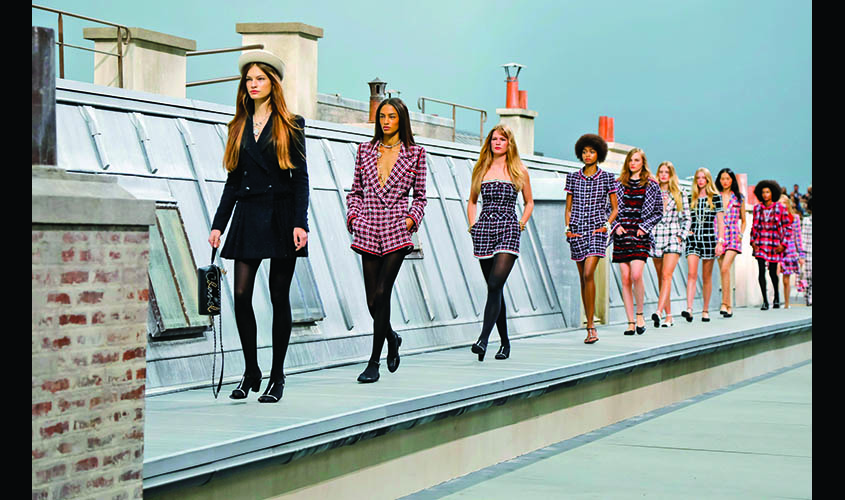It’s a complicated thing for a designer to be responsible for the last show of a fashion week: There’s an expectation, illogical though it may be, that the event may somehow sum up all the others; put a nice, neat bow on top. This is compounded when the show is the last show of the whole four-city season, and it’s even more fraught when the season we are talking about is the first season of the next 10 years.

On the other hand, that designer also gets the last word.
So what was Nicolas Ghesquière, artistic director of Louis Vuitton women’s wear, saying Tuesday night as a dark courtyard of the Louvre was illuminated by hundreds of smartphone lights from the crowd waiting just outside the barricades (clamoring for a glimpse of Alicia Vikander, Ruth Negga, Catherine Deneuve) and the spring 2020 ready-to-wear marathon came to an end?
Ghesquière had built a giant, plain plywood box (from sustainably sourced wood, of course, all to be recycled) inside the Cour Carrée. On one wall of the box was a giant screen and on it, a video of a woman’s head, neck and shoulders, set against a lightening sky was playing. Her eyes were closed, as in repose. The sun rose behind her, and gradually they widened. Then she opened her lipsticked mouth and began to sing, and a door in the base of her throat (well, not literally: it was in the wall) opened, too. Out a model emerged, like Athena from her father Zeus’s head—but not exactly. The tune, by Sophie Xeon (known professionally as SOPHIE), the Scottish video and music producer and artist, was “It’s Okay to Cry.”
Thus the dawn of a new decade.

Also some old ones. Ghesquière was at romp in the fields of fashion, mixing up Belle Époque prints—swirling curlicues and Art Nouveau portraits; fecund florals; thoughts of Sarah Bernhardt and Marcel Proust—with rainbow sequin zigzag knits and lacy embroidered tulle. The silhouettes had a contemporary motility (thank goodness, no panniers) though there were some puffed sleeves. Also skater skirts and tulip skirts; flared, cropped trousers; neat jackets, and bibbed dresses. Waists were small and the dominant shape was an angular hourglass. On every look, a curling cattleya orchid was pinned.
In an interview before the show, Ghesquière talked about how “today’s world can create anxiety; a fear of ‘what’s going to happen,’” and the desire to “not make things too new. We don’t always have to be scared of retro,” he continued. “We grow from what we learn.”
Fashion is in the midst of a whole lot of growing pains. And yet rather than retreating into the glories and comfort of the past, it is putting it all in the centrifuge and going for a spin. There’s a sense that things need to change, and not in the sped-up, frenetic way prompted by the dawn of Instagram a few years ago—not in the get-everything-to-everyone-all-the-time way of endless drops and constant content delivery—but in a deeper, more systemic way that involves challenging received convention and tradition. Yet it clings to those traditions even as schisms appear on all sides because: Help! What’s next? New social groups—the communities fashion serves, or should serve—are emerging and coming to fore, new value sets cohering.
Miuccia Prada acknowledged that reality in her Miu Miu show, a parade of sweater girls that had come undone, in fuzzy angora and curvy pencil skirts with kick pleats at the knees, sleeveless coats with mismatched rows of buttons (one, plain and neat; one, big and playful), and raw linen smocks sometimes covered in drips of paint from the little flowers that had been daubed on. See what you want—a little bit 1950s, a little bit Hitchcock—but in the end we are all our own canvas, free to scribble as we will. Might as well make it clear.
The questioning began in New York with the rebel yell of a new group of designers breaking through, continued in the existential identity crisis of London, pretty much skipped Milan and burst into full-bloom in Paris, where a sense of impending doom (environmental, political) drove some of the best work in seasons.
There’s no resting on the laurels of the logo, or the artistry of the atelier. That produces results that can be pretty, but insubstantial. Too much is going on. Fashion is either a part of the broader conversation, as it ought to be, since it provides the uniforms that reflect its unspoken cues, or—who cares? The bar should be high.
The time of ceding the high ground to streetwear; the time when designers blathered on about “just clothes,” is at an end. That’s so 20-teens. 2020 is coming. Time to get dressed.
© 2019 THE NEW YORK TIMES

